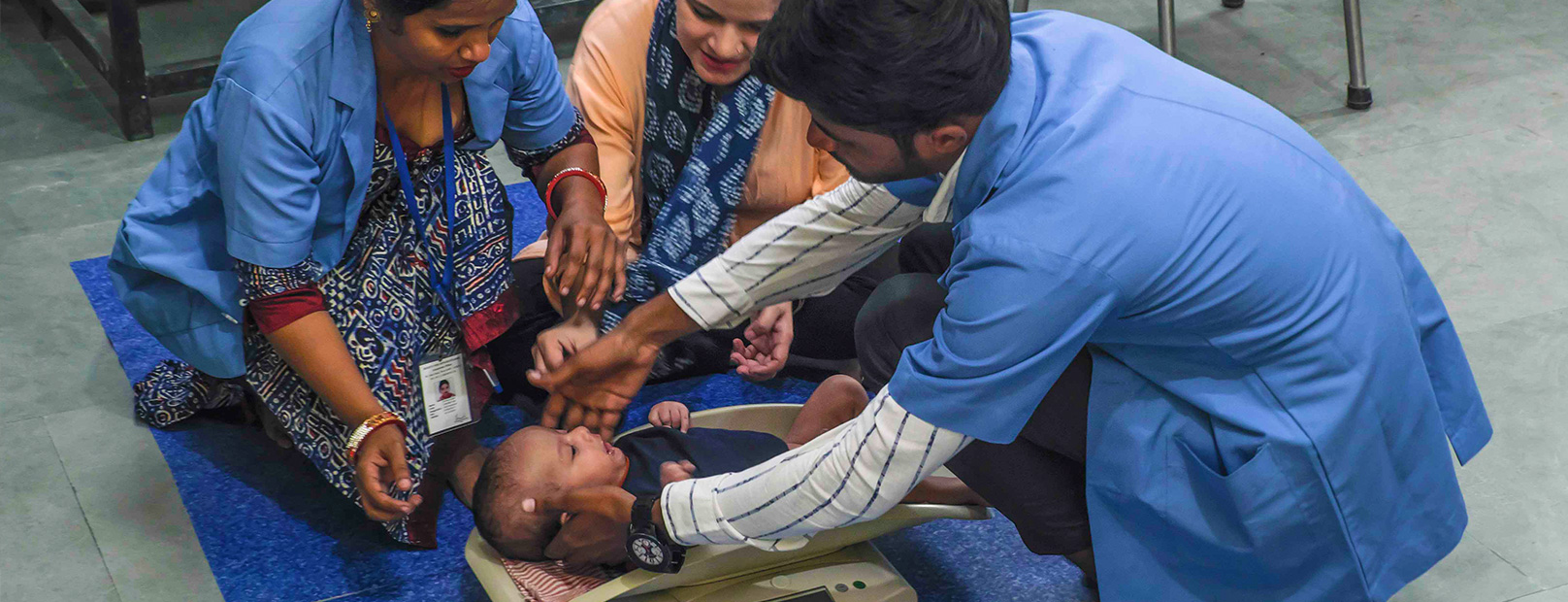- Home
- Themes
- Maternal and Child Health
- All Children Thriving

All Children Thriving (ACT) call was launched with the aim of investigating novel cost-effective measurement tools and mechanisms to combat unhealthy birth, growth and development in children, as one of the early proof-of-concept programs in the maternal and child health portfolio.
Seven proposals are supported under this program and each project explores a unique aspect of the issue with special emphasis on innovative, impactful research on maternal and child health and development. Three projects are aimed at developing simple low-cost biomarkers that can be applied early in life to detect and predict adverse outcomes in mothers and children.
A large population, immense geographical diversity, poverty, illiteracy, and social and cultural issues all affect maternal and child health. A child’s health is inextricably linked to the mother’s health. To tackle this huge challenge, especially in developing countries, we have made maternal and child health an important vertical to direct investments. Our program aims to ensure the survival of mothers and their children and ensure that they lead healthy and productive lives.
Organisation- Translational Health Sciences and Technology Institute, Faridabad- The most arduous and expensive component of any medical and scientific research is collecting the biological samples with complete clinical and socio-demographic details. The realization of the same led to the clear necessity of creating bio-banks/ repositories for collecting, processing and storage of biospecimens along with their health information to significantly support current and future scientific investigations. This project has created India’s first bio-bank or repository and is longitudinally collecting biological specimens from more than 5000 pregnant women, accompanied with well characterized information on the associated environmental, clinical, social and epidemiological determinants through the course of the pregnancy. By providing access to relevant biospecimens and employing a multi-disciplinary approach (clinical, epidemiological, statistical, genetic, microbial, proteomic, and imaging sciences) the platform is aimed at addressing multiple strategic priorities in preterm birth, discovery and development. In addition, the infrastructure is also intended to attract young investigators for developing new research questions using stored/ collected data and upgrade scientific community knowledge on maternal and child health (MCH) through capacity building.
Organisation- Society for Applied Studies, New Delhi- Previously called the Linear Growth Study, this study is aimed at achieving optimal growth and development in infants and children living in low resource settings in India, through the integrated delivery of a package of evidence-based interventions endorsed in national programs and by the World Health Organization (WHO). This individually randomized factorial design trial is assessing the impact of a package of health, nutrition, psychosocial care and environmental interventions delivered throughout the pre and peri-conception period, pregnancy and first 2 years of life on both weight and length and stunting at 2 years of age. The recruitment of target beneficiaries i.e 13,500 married women between 18 to 30 years of age in the pre- and peri-conception period have been recruited in the study. The recruited women are randomized to the intervention and control groups and are being followed up for intended outcomes. This trial offers a great opportunity to learn about vertically and horizontally linked intervention delivery that provides continuity of care from pre-pregnancy through early childhood. The learnings may aid in determining future design of health systems. Furthermore, the evidence drawn from the study could address important questions and may also form the basis of ideas for the National Nutrition Mission (NNM) in India.
The seed grants for this program are as follows:
Organization- National Institute of Biomedical Genomics, Kalyani, West Bengal
The study intends to develop biological markers of stress during pregnancy that correlate with enhanced risk of adverse outcomes in mothers and their babies.
This project was attempting to fill in the primary gap of lack of an inexpensive, simple biomarker of future short stature that can be applied early in life.
Organisation- SRM Institutes of Medical Sciences, Chennai, Tamil Nadu
The project proposes to feed a safe and readily available resistant starch, namely high amylose maize starch, HAMS to participants (women, 18-21 years and infants, 6-8 months) in a series of studies, with appropriate consent, and to longitudinally collect fecal samples for microbiota analysis using next generation sequencing. The basic assumption is that the prebiotic intervention will enhance the growth of beneficial bacteria and reduce the carriage of harmful bacteria / enteric pathogens in the faeces of these two groups of individuals.
Organisation- Mamta Health Institute for Mother and Child, New Delhi and Mahatma Gandhi Institute of Medical Sciences, Wardha
Currently, there is no simple test/ biomarker available to screen women at risk of PTB in resource-constrained settings. The study hypothesis was to successfully validate whether the salivary progesterone test could serve as an inexpensive, easy to use, non-invasive and acceptable test for early detection of the risk of PTB among pregnant women in rural India.
Organisation-Centre for Plant Molecular Biology and Biotechnology, Coimbatore in collaboration with Home Science College and Research Institute, Madurai and University of California Davis, California, USA
The study was aimed at evaluating the development of nutrient- rich genotypes in rice possessing the key nutraceuticals and therapeutic clues through which required nutrients such as iron and zinc for pregnant women and infants of rural households will be supplemented sustainably. Improved line of rice will be compared with the traditional parents and other popularly eaten white rice varieties for its nutritional content and therapeutic values. The improved lines of rice having nutritive, anti-diabetic and therapeutic characters may be registered.